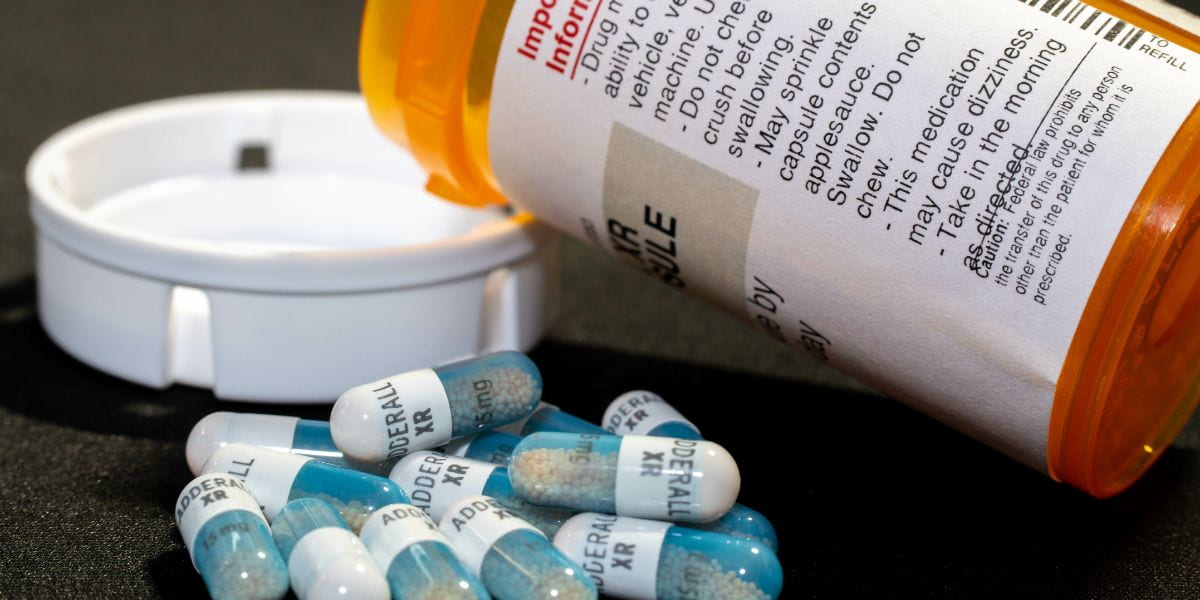Adderall Side Effects and Dangers of Use


Adderall, a commonly prescribed stimulant, is often used to treat attention-deficit hyperactivity disorder (ADHD) and narcolepsy. While it can be highly effective in managing these conditions, the use of Adderall is not without risks. Adderall can be addictive and may cause heart problems. Long-term use can lead to dangerous side effects.
What Is Adderall?
Adderall is a prescription drug that combines two active ingredients: amphetamine and dextroamphetamine. These compounds impact brain and nerve chemicals, influencing hyperactivity and impulse regulation. Adderall is available in immediate-release tablets and extended-release capsules (Adderall XR), providing flexibility in managing symptoms of ADHD and narcolepsy.
Adderall raises the concentrations of specific neurotransmitters in the brain, like dopamine and norepinephrine. For people with ADHD, this can lead to improved focus, better task completion, and overall enhanced cognitive function. However, the drug’s stimulating effects can also raise your blood pressure and heart rate, leading to potential health risks
The extended-release capsule helps people with ADHD by providing a steady release of medication all day long. This formula helps maintain a steady drug level in the blood. As a result, fewer doses are required. This makes it more likely for people to adhere to their treatment plan.
What Does Adderall Do to You?
When taken as prescribed, Adderall helps increase attention and decrease impulsiveness and hyperactivity in people with ADHD. The medication alters the balance of certain natural substances in the brain. ADHD can lead to improved focus, better school or work performance, and fewer ADHD symptoms for those affected by it.
However, Adderall can also cause significant changes in the body, mainly when not used as prescribed. This substance is regulated because of its possible misuse and addiction potential. Some people take Adderall without a prescription to improve their focus, especially college students studying for exams. This can be harmful to their health.
Many young adults and college students misuse Adderall to improve their academic performance and gain an advantage over others. This non-prescribed use can lead to severe health consequences, including addiction and a range of physical and mental health issues. Adderall can be addictive and increase the risk of abuse due to its euphoric effects, like other stimulants.

What Are the Side Effects of Adderall?
Adderall can cause a range of side effects, varying in severity from mild to severe. Common side effects include:
- Dry Mouth: Many users experience a decrease in saliva production, leading to discomfort and dental issues.
- Loss of Appetite: Adderall often suppresses appetite, which can lead to significant weight loss, particularly in young adults and college students.
- Trouble Sleeping: The stimulating effects of Adderall can make it difficult for users to fall and stay asleep.
- Increased Heart Rate and Blood Pressure: These cardiovascular effects can pose risks, especially for people with pre-existing heart conditions and poor blood circulation.
- Mental Health Issues: Some users may experience anxiety, agitation, or even aggressive behavior as a result of taking Adderall.
Long-term Side Effects
Long-term use of Adderall can result in various adverse effects on health. The adverse effects of Adderall can be particularly pronounced in people who use the drug without medical supervision. The risk of heart problems, such as increased heart rate and high blood pressure, is a significant concern. These heart issues can escalate into more severe conditions, including heart attacks and strokes, particularly in those with underlying heart conditions.
Dangers of Adderall Use
While Adderall can be beneficial when used correctly, it also carries several dangers, particularly when misused or taken over the long term. The potential dangers include:
Habit Forming and Addiction
Adderall is a controlled substance because of its potential for abuse and addiction. Even those who take Adderall as prescribed can develop a dependency on the drug, leading to Adderall addiction. The euphoric effects experienced by some users can make it habit-forming, and increasing doses to maintain these effects can lead to serious health risks.
The addictive nature of Adderall stems from its impact on the brain’s reward system. By increasing dopamine levels, a neurotransmitter associated with pleasure and reward, Adderall can create a sense of euphoria that some people find irresistible. This can lead to a cycle of increasing dosage and frequency of use, ultimately resulting in abuse and addiction.
Long-term Health Problems
Long-term use of Adderall can result in various adverse effects on health, including:
- Heart Problems: Chronic use can lead to serious cardiovascular issues, such as heart palpitations, chest pain, heart disease, and an increased risk of heart attack or stroke.
- Mental Health Issues: Prolonged use can exacerbate or trigger mental health conditions, including anxiety, depression, and psychosis.
- Physical Health Issues: Users may experience adverse physical effects like weight loss, malnutrition, and issues with growth in children and adolescents.
The physical consequences of long-term Adderall use can be substantial. Weight loss and malnutrition are common among chronic Adderall users, as the drug’s appetite-suppressing effects can lead to a significant reduction in food intake. This can result in deficiencies in essential nutrients, further compromising overall health.
Withdrawal Symptoms
Stopping Adderall suddenly can lead to withdrawal symptoms, which may include fatigue, depression, and changes in sleep patterns. These symptoms can make it difficult for people to stop using the drug, perpetuating the cycle of dependence and addiction.
Adderall withdrawal can be challenging, both physically and mentally. The body becomes accustomed to the presence of the drug, and its sudden absence can result in a range of symptoms, including severe fatigue and depression. These withdrawal symptoms can be powerful motivators to continue using the drug, making it difficult to break free from the cycle of addiction.
Risk of Abuse
Adderall is often abused by people seeking to enhance cognitive performance, such as college students during exam periods. This non-prescribed use can lead to severe consequences, including:
- Aggressive Behavior: High doses can cause aggressive or hostile behavior.
- Cardiovascular Issues: Misuse can significantly raise heart rate and blood pressure, leading to severe heart problems.
- Psychiatric Problems: Abuse can result in paranoia, hallucinations, and other serious mental health issues, such as suicidal thoughts.
The risk of abuse is particularly high among populations seeking to improve academic or professional performance. The pressure to succeed can drive people to misuse Adderall, often without understanding the full scope of the potential consequences. The aggressive behavior and psychiatric problems that can result from high doses of Adderall misuse highlight the dangers of using this medication without proper medical guidance and supervision.

Adderall Addiction Treatment
Recognizing and treating Adderall addiction is crucial for those struggling with dependence on this medication. Adderall, when used correctly, can effectively treat ADHD and narcolepsy. However, the potential side effects and dangers of misuse, particularly the risk of addiction and long-term health problems, make it a drug that must be used with caution.
White Oak Recovery Center provides intensive inpatient addiction treatment with evidence-based treatments and therapies for substance use and co-occurring disorders.
WORC offers medical detox for a safe Adderall withdrawal with medical supervision and medication-assisted treatment to help with withdrawal symptoms and any co-occurring mental health disorders, along with dual diagnosis treatment.
Our compassionate and experienced team of addiction treatment specialists ensure a caring, family environment where all residents are treated with dignity and respect.
Recovery from the grip of substance use is possible. Our treatment specialists are eager to talk with you and discuss your needs and treatment options.
A life rooted in recovery can begin with a phone call. Reach out today.

Am I covered for addiction treatment?
Your insurance may cover treatment. Call now for an entirely free and confidential assessment. Recovery starts with a phone call.

- Sicholima, Tangu, and Rieder, Michael J., “Adderall and Cardiovascular Risk: A Therapeutic Dilemma.” Pediatrics and Child Health, Mar. 2009.
- Berman, Steven M., et al., “Potential Adverse Effects of Amphetamine Treatment on Brain and Behavior: A Review.” Mol Psychiatry, Feb. 2009.
- Martin, Dustin, and Le, Jacqueline K., “Amphetamine.” StatPearls: National Library of Medicine, Jul. 2023.
- “Dextroamphetamine and Amphetamine.” MedlinePlus: National Library of Medicine, Jul. 2024.
- Shoar, Nazila Sharbaf, et al., “Dextroamphetamine-Amphetamine.” StatPearls: National Library of Medicine, May 2023.
Medical Disclaimer:







